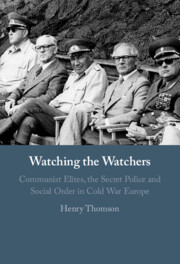
- Publisher:
- Cambridge University Press
- Online publication date:
- February 2024
- Print publication year:
- 2024
- Online ISBN:
- 9781009413602


Throughout history, dictators have constructed secret police agencies to neutralize rivals and enforce social order. But the same agencies can become disloyal and threatening. This book explores how eight communist regimes in Cold War Europe confronted this dilemma. Divergent strategies caused differences in regimes of repression, with consequences for social order and political stability. Surviving the shock of Josef Stalin's death, elites in East Germany and Romania retained control over the secret police. They grew their coercive institutions to effectively suppress dissent via surveillance and targeted repression. Elsewhere, ruling coalitions were thrown into turmoil after Stalin's death, changing personnel and losing control of the security apparatus. Post-Stalinist transitions led elites to restrict the capacity of the secret police and risk social disorder. Using original empirical analysis that is both rigorous and rich in fascinating detail, Henry Thomson brings new insights into the darkest corners of authoritarian regimes.
‘With rigorous empirics and deep historical knowledge, Henry Thomson takes us inside the workings of secret police organizations across Central and Eastern Europe, showing that efforts to control these coercive organizations set otherwise similar communist regimes on divergent pathways for decades during the Cold War. His careful analysis is a model of comparative scholarship, and sheds important light on one of the darkest areas of authoritarian rule.’
Sheena Chestnut Greitens - Associate Professor, University of Texas, Austin
‘Capitalizing on the explosion of primary-source research on the evolution of the security services in Cold War Eastern Europe, this book develops an elegant theory that links the lack of elite cohesion in the post-1953 Eastern Bloc countries to a decline in the strength of the secret police. A must-read for students of authoritarianism.’
Martin Dimitrov - Professor of Political Science, Tulane University
‘Henry Thomson’s Watching the Watchers adds important empirical dimensions to our understanding of the establishment, role, and development of secret police services in East-Central Europe, with special emphasis on Poland and the German Democratic Republic, from 1945 until the fall of communism in 1989. His systematic analysis, which focuses on the relationship between party authorities and the security apparatus, is ably supplemented by a multiplicity of useful and informative tables, graphs, and diagrams.’
Norman M. Naimark - Robert and Florence McDonnell Chair in East European History, Stanford University
‘This carefully crafted study tries to identify the reasons why state security forces in communist Central and Eastern Europe varied not only in strength but also in time. Relying on a carefully crafted innovative research design, this book marshals a wealth of newly accessed data to illuminate a fascinating but still understudied topic. Thomson manages to provide a compelling argument that can apply to authoritarian regimes in other parts of the world.’
Lavinia Stan - St. Francis Xavier University, Canada
 Loading metrics...
Loading metrics...
* Views captured on Cambridge Core between #date#. This data will be updated every 24 hours.
Usage data cannot currently be displayed.